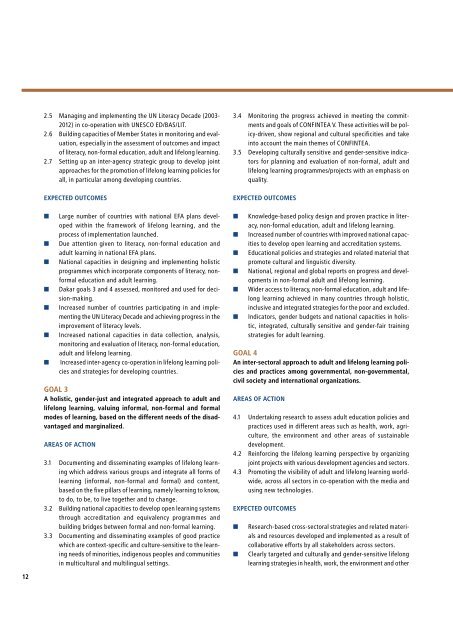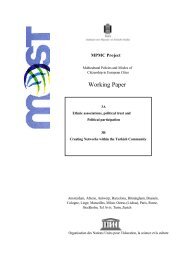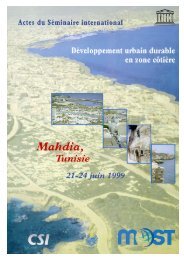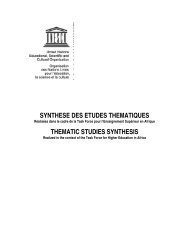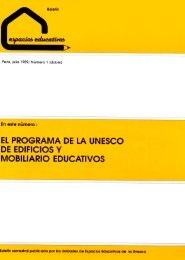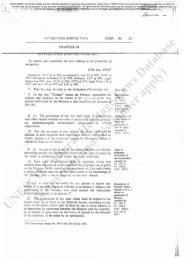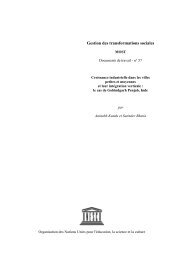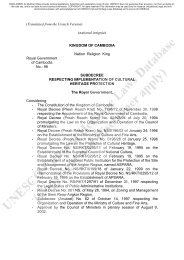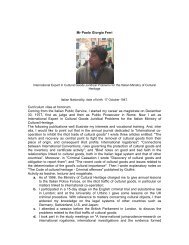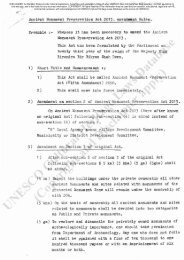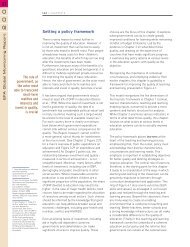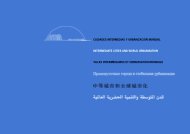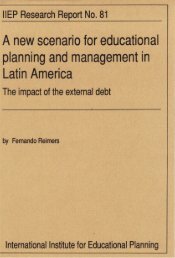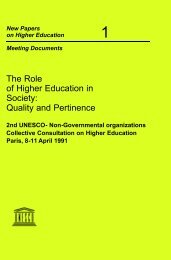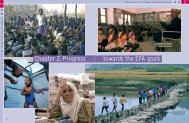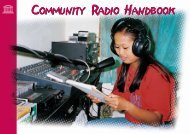NURTURING THE TREASURE NURTURING THE ... - Unesco
NURTURING THE TREASURE NURTURING THE ... - Unesco
NURTURING THE TREASURE NURTURING THE ... - Unesco
Create successful ePaper yourself
Turn your PDF publications into a flip-book with our unique Google optimized e-Paper software.
2.5 Managing and implementing the UN Literacy Decade (2003-<br />
2012) in co-operation with UNESCO ED/BAS/LIT.<br />
2.6 Building capacities of Member States in monitoring and evaluation,<br />
especially in the assessment of outcomes and impact<br />
of literacy, non-formal education, adult and lifelong learning.<br />
2.7 Setting up an inter-agency strategic group to develop joint<br />
approaches for the promotion of lifelong learning policies for<br />
all, in particular among developing countries.<br />
EXPECTED OUTCOMES<br />
■<br />
■<br />
■<br />
■<br />
■<br />
■<br />
■<br />
Large number of countries with national EFA plans developed<br />
within the framework of lifelong learning, and the<br />
process of implementation launched.<br />
Due attention given to literacy, non-formal education and<br />
adult learning in national EFA plans.<br />
National capacities in designing and implementing holistic<br />
programmes which incorporate components of literacy, nonformal<br />
education and adult learning.<br />
Dakar goals 3 and 4 assessed, monitored and used for decision-making.<br />
Increased number of countries participating in and implementing<br />
the UN Literacy Decade and achieving progress in the<br />
improvement of literacy levels.<br />
Increased national capacities in data collection, analysis,<br />
monitoring and evaluation of literacy, non-formal education,<br />
adult and lifelong learning.<br />
Increased inter-agency co-operation in lifelong learning policies<br />
and strategies for developing countries.<br />
GOAL 3<br />
A holistic, gender-just and integrated approach to adult and<br />
lifelong learning, valuing informal, non-formal and formal<br />
modes of learning, based on the different needs of the disadvantaged<br />
and marginalized.<br />
AREAS OF ACTION<br />
3.1 Documenting and disseminating examples of lifelong learning<br />
which address various groups and integrate all forms of<br />
learning (informal, non-formal and formal) and content,<br />
based on the five pillars of learning, namely learning to know,<br />
to do, to be, to live together and to change.<br />
3.2 Building national capacities to develop open learning systems<br />
through accreditation and equivalency programmes and<br />
building bridges between formal and non-formal learning.<br />
3.3 Documenting and disseminating examples of good practice<br />
which are context-specific and culture-sensitive to the learning<br />
needs of minorities, indigenous peoples and communities<br />
in multicultural and multilingual settings.<br />
3.4 Monitoring the progress achieved in meeting the commitments<br />
and goals of CONFINTEA V. These activities will be policy-driven,<br />
show regional and cultural specificities and take<br />
into account the main themes of CONFINTEA.<br />
3.5 Developing culturally sensitive and gender-sensitive indicators<br />
for planning and evaluation of non-formal, adult and<br />
lifelong learning programmes/projects with an emphasis on<br />
quality.<br />
EXPECTED OUTCOMES<br />
■<br />
■<br />
■<br />
■<br />
■<br />
■<br />
Knowledge-based policy design and proven practice in literacy,<br />
non-formal education, adult and lifelong learning.<br />
Increased number of countries with improved national capacities<br />
to develop open learning and accreditation systems.<br />
Educational policies and strategies and related material that<br />
promote cultural and linguistic diversity.<br />
National, regional and global reports on progress and developments<br />
in non-formal adult and lifelong learning.<br />
Wider access to literacy, non-formal education, adult and lifelong<br />
learning achieved in many countries through holistic,<br />
inclusive and integrated strategies for the poor and excluded.<br />
Indicators, gender budgets and national capacities in holistic,<br />
integrated, culturally sensitive and gender-fair training<br />
strategies for adult learning.<br />
GOAL 4<br />
An inter-sectoral approach to adult and lifelong learning policies<br />
and practices among governmental, non-governmental,<br />
civil society and international organizations.<br />
AREAS OF ACTION<br />
4.1 Undertaking research to assess adult education policies and<br />
practices used in different areas such as health, work, agriculture,<br />
the environment and other areas of sustainable<br />
development.<br />
4.2 Reinforcing the lifelong learning perspective by organizing<br />
joint projects with various development agencies and sectors.<br />
4.3 Promoting the visibility of adult and lifelong learning worldwide,<br />
across all sectors in co-operation with the media and<br />
using new technologies.<br />
EXPECTED OUTCOMES<br />
■<br />
■<br />
Research-based cross-sectoral strategies and related materials<br />
and resources developed and implemented as a result of<br />
collaborative efforts by all stakeholders across sectors.<br />
Clearly targeted and culturally and gender-sensitive lifelong<br />
learning strategies in health, work, the environment and other<br />
12


